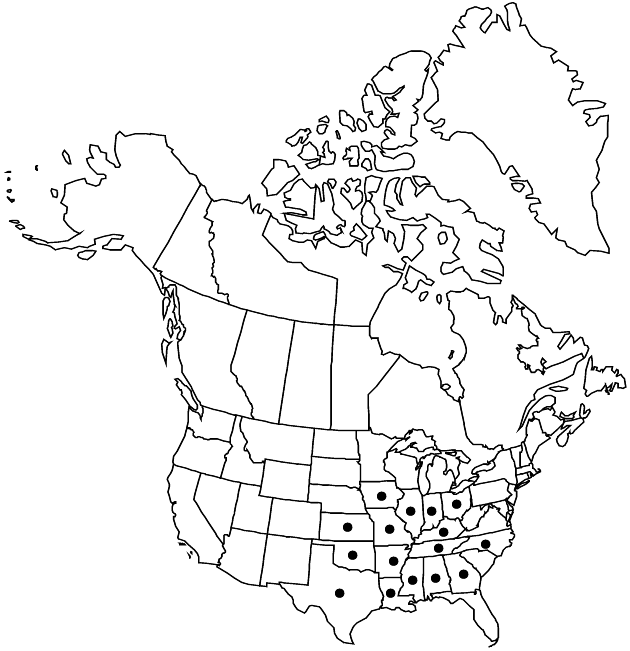Difference between revisions of "Verbesina helianthoides"
Fl. Bor.-Amer. 2: 135. 1803.
FNA>Volume Importer |
imported>Volume Importer |
||
| (6 intermediate revisions by 2 users not shown) | |||
| Line 6: | Line 6: | ||
|place=2: 135. 1803 | |place=2: 135. 1803 | ||
|year=1803 | |year=1803 | ||
| + | }} | ||
| + | |special_status={{Treatment/ID/Special_status | ||
| + | |code=E | ||
| + | |label=Endemic | ||
}} | }} | ||
|basionyms= | |basionyms= | ||
| Line 23: | Line 27: | ||
|elevation=70–500 m | |elevation=70–500 m | ||
|distribution=Ala.;Ark.;Ga.;Ill.;Ind.;Iowa;Kans.;Ky.;La.;Miss.;Mo.;N.C.;Ohio;Okla.;Tenn.;Tex. | |distribution=Ala.;Ark.;Ga.;Ill.;Ind.;Iowa;Kans.;Ky.;La.;Miss.;Mo.;N.C.;Ohio;Okla.;Tenn.;Tex. | ||
| − | |discussion=<p>Verbesina helianthoides may be no longer present in Georgia.</p> | + | |discussion=<p><i>Verbesina helianthoides</i> may be no longer present in Georgia.</p> |
|tables= | |tables= | ||
|references= | |references= | ||
| Line 32: | Line 36: | ||
-->{{#Taxon: | -->{{#Taxon: | ||
name=Verbesina helianthoides | name=Verbesina helianthoides | ||
| − | |||
|authority=Michaux | |authority=Michaux | ||
|rank=species | |rank=species | ||
| Line 46: | Line 49: | ||
|publication title=Fl. Bor.-Amer. | |publication title=Fl. Bor.-Amer. | ||
|publication year=1803 | |publication year=1803 | ||
| − | |special status= | + | |special status=Endemic |
| − | |source xml=https:// | + | |source xml=https://bitbucket.org/aafc-mbb/fna-data-curation/src/2e0870ddd59836b60bcf96646a41e87ea5a5943a/coarse_grained_fna_xml/V19-20-21/V21_258.xml |
|tribe=Asteraceae tribe Heliantheae | |tribe=Asteraceae tribe Heliantheae | ||
|subtribe=Asteraceae (tribe Heliantheae) subtribe Ecliptinae | |subtribe=Asteraceae (tribe Heliantheae) subtribe Ecliptinae | ||
Latest revision as of 20:10, 5 November 2020
Plants 60–120+ cm (perennating bases ± erect or horizontal rhizomes, internodes winged). Leaves all or mostly alternate (proximal sometimes opposite); blades ± lance-ovate to lanceolate, 5–12+ × 2–5+ cm, bases ± cuneate, margins ± toothed, apices acute to attenuate, faces strigose to sericeous. Heads 2–5(–10+) in ± corymbiform arrays. Involucres ± hemispheric, 10–15+ mm diam. Phyllaries 16–21+ in 2–3 series, ± erect, lanceolate, 6–9+ mm. Ray florets 8–13+; laminae 20–25(–30+) mm. Disc florets 40–80+; corollas yellow. Cypselae dark brown to black, oblanceolate to elliptic, 5 mm, faces strigillose to glabrate; pappi 0.5–1.5 mm. 2n = 34.
Phenology: Flowering May–Jul.
Habitat: Moist places in sandy, pine woodlands, post-oak woodlands, disturbed places
Elevation: 70–500 m
Distribution

Ala., Ark., Ga., Ill., Ind., Iowa, Kans., Ky., La., Miss., Mo., N.C., Ohio, Okla., Tenn., Tex.
Discussion
Verbesina helianthoides may be no longer present in Georgia.
Selected References
None.